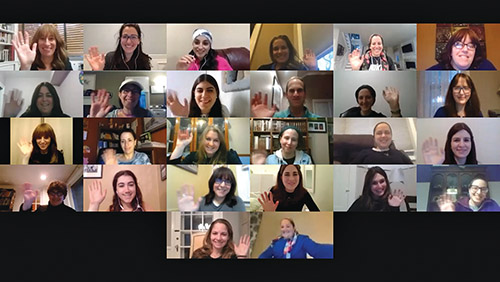
On Tuesday, April 28, the U.S. Navy Blue Angels and the U.S. Air Force Thunderbirds performed a stunning show to honor the first responders on the front lines of the coronavirus pandemic. Flying in formation over Manhattan and the Brooklyn Bridge, our country expressed our collective gratitude to and admiration for this exceptional group of people.
Cheering for medical workers has become a new national institution. In coordinated efforts, neighborhood by neighborhood, people step out on their porches and doorsteps to give a round of enthusiastic applause for medical staff that can be heard echoing through the air. Such shows of honor are befitting for the men and women who put their own health in jeopardy to combat this invisible, fearsome enemy.
While the obstacles being confronted by our medical community are evident, the circumstances we all are facing have posed unprecedented demands on a myriad of professionals and individuals. As a school administrator and a parent, I have witnessed firsthand the daunting challenges encountered by grade-school teachers in particular. Thrust into unchartered waters, educators all across the country have been going far beyond the call of duty to navigate the situation we find ourselves in and offer support to a vulnerable group of individuals: our children.
With no lead time or structure to drop into, teachers in every corner of the world have done and continue to do what nobody believed could be done. There is no section in any teacher’s handbook titled “school policies and procedures for long-term school closures.” There were layers of challenges that educators were faced with. Setting up a distant learning model without a precedent was disorienting and confusing. Many educators have family responsibilities and continue to juggle the needs of their children and the needs of their students. Additionally, the urgency and immediacy in which a new educational structure had to be created and implemented is almost inconceivable.
The world of chinuch has undergone a serious transformation, with rebbeim and teachers trying their best to provide remote learning under extremely difficult circumstances. This is a watershed moment, a critical turning point in which the collective strength of our educators is coming to the fore.
Teachers and support staff are working harder than ever to ensure that students continue to receive quality education and advance in their skills and knowledge. There seems to be an endless stream of creativity, innovative ideas being churned out, and a quest to outdo themselves each and every day.
Both in Judaic and general studies, classes are interactive and engaging, whether they are being delivered live or have been pre-recorded. Teachers prepare slides, interactive activities, visuals, games, video clips, all to guarantee a full integrative learning experience. Producing remote learning materials takes an inestimable amount of hours. For every class given, the preparation preceding the lesson is often triple the amount of time of the lesson itself. The results are evident in student participation and enthusiasm. On April 21, a tele-conference company reported 530,000 minutes of usage in just one day.
From school to school, stories pop up telling of unique and motivating incentive systems that have been generated to keep children interested and excited to maintain what they have learned and continue on in their learning. Teachers delivering prizes to doorsteps and porches is not uncommon. Extra-curricular activities, school-wide contests, and activities that promote health and wellness have been offered to children of all ages and abilities. A selfless rebbi from Passaic runs a virtual night seder program for 1,000+ middle school boys five nights a week. Every rebbi, morah, teacher and therapist has contributed to a dazzling educational experience, unimaginable just two months ago.
In an uncertain world, teachers have been equally focused on making students feel connected to their teachers and friends. Principals and teachers are driving through neighborhoods on a set schedule to allow students to wave and receive a warm smile and wave in return.
The emotional well-being of their students is of primary importance. Many teachers spend their precious time in the evening reaching out to students in person, maintaining and strengthening their personal connection and conveying a sense of importance to the child.
May the day soon come that we look back at this time as the virus recedes into history. The discussion about how we change as individuals and as a people is well underway. The many takeaways that have bandied about all have merit. While we are experiencing the homeschooling of our children, it is worthy to store yet one more takeaway: the superiority and rock-solid devotion of our educators. As we began the free-fall into these frightening times, our childrens’ teachers displayed dedication, commitment, strength, and positivity. They continue to be the anchors for our children in stormy times. They combine the wisdom of Shlomo HaMelech and the patience of Hillel. Motivated by their mission to be there for children, and powered by their passion to keep learning and thriving, they are doing phenomenal work without fanfare.
In reference to our educators, the pasuk in the book of Daniel states, “Umatzdikei harabim kakochavim l’olam va’ed.” Those who teach others shall shine like stars forever. May your light never fade.
Teachers, the sound may be “muted,” but if you listen closely you will hear faint sounds. We are all clapping for you.
Miriam Nekritz is the associate director of SINAI at RYNJ. SINAI operates multiple inclusive special education schools for children who have a wide range of developmental, intellectual and complex learning disabilities.













